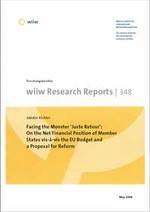Facing the Monster 'Juste retour': On the Net Financial Position of Member States vis-à-vis the EU Budget and a Proposal for Reform
wiiw Research Report No. 348, May 2008
109 pages including 54 Tables and 2 Figures
The 'juste retour' attitude, namely each EU member state's priority for securing the best possible individual net financial position vis-à-vis the community budget over any other consideration concerning the community budget is stronger than ever. The differences across member states in terms of net financial positions are indeed remarkable. In the period 1997-2006 the group of major net payer countries (the Netherlands, Germany, Sweden and Austria) had an average 'deficit' vis-à-vis the EU budget amounting to 0.35% of the GNI. For the group of minor net payers (Denmark, France, Finland and Italy) the respective indicator was 0.08% only. The UK with its rebate stood closer to the second group. The full impact of the 2004/2007 enlargement will be felt in 2013, after the 'phasing in' process will have been nearly completed. Estimated net financial positions for 2013 show that major net payers' financial positions will not change significantly but those of the minor payers' will deteriorate to a large extent. The net beneficiary member states will typically get substantially less (net) EU transfers than the cohesion countries had received in the 1990s.
Several reform proposals envisage the introduction of a European tax. Various candidates for this tax were tested in the paper for fulfilling the requirement for proportionality of contributions to the EU budget with economic strength of the member states. The results show that a couple of member states would contribute substantially more or less to the community budget than their share is in the aggregate EU GNI, thus these taxes would open up a new battlefield for ¿juste retour¿ discussions. On the expenditure side of the EU budget conditions of eligibility for support have emerged over decades in the framework of various, with one another unrelated, EU policies. This led to a strong differentiation in the extent of financial support by member states, decoupled from their relative prosperity. Germany and the UK were overall 'losers' as in each main policy areas their share was substantially lower than in the aggregate EU GNI in 1997-2006. The Netherlands joined the club of overall 'losers' from 2003 on. The results of an estimation for 2013 hint at increasing polarization. 8 member states will be 'losers' both in agricultural and cohesion expenditures while 13 member states 'winners' in both areas, and only 6 of the 27 will have mixed position.
The final chapter of the paper presents a comprehensive reform proposal which faces the juste retour problem frontally instead of negating or circumventing it. The corner stone of the proposed system is the EU 27 average per capita GNI, at official exchange rate. Each member state would receive annually a transfer from the EU budget that corresponds to 1% of the EU average per capita GNI multiplied by the number of inhabitants in the member state concerned. The revenues of the EU budget would be secured through contributions from member states, which would amount to 1% of the member state GNI. Member states with higher than EU average per capita GNI would be thus net payers, those with lower than the average per capita GNI of the EU would be net beneficiaries. Net contributions and receipts, respectively, would clearly reflect the difference in relative prosperity of the member states. This proposition is supplemented by recommendations for reform both on the revenues and expenditures sides of the EU budget. Comparing the estimated financial position of net payer member states in 2013 under the prevailing and the reformed system, respectively, show that each net payer would come off better, though to varying extent, under the new regime. Further enlargements, even with Turkey, would create an average net financial position for this group of member states matching that had been prevailing in 1997-2006. The same comparison for the net beneficiary member states, however, indicates less gains under the new regime. Clear rules for the post-2013 years, smaller, but safely secured and for the long run foreseeable transfers from the EU budget, further significantly increased flexibility in utilization of the EU resources may win the net beneficiary member states for the reforms proposed.
Keywords: EU budget, cross member state redistribution, juste retour, fair sharing of burdens, net financial position, own resources and expenditures, financial perspective, reform, European tax
JEL classification: F15, F36, H20, H23, H70, H77, H87
Countries covered: Visegrad countries, European Union, New EU Member States, SEE
Research Areas: Macroeconomic Analysis and Policy
